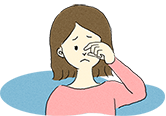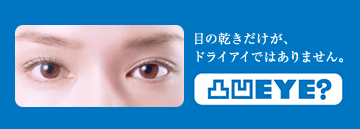Causes of Dry Eye
Dry eye is connected with the reduction of tear secretion and increase in the amount of tear evaporation from the eye surface. Recent research has also found that when there is a dysfunction in the mucous membrane on the surface of the eye, it becomes unable to maintain an adequate volume of tears. Unable to retain moisture, the surface of the eye becomes bumpy, which, in turn, leaves the eye vulnerable not only to bacteria and foreign bodies but also to a vicious cycle of friction and dryness.If this condition persists, symptoms such as eye discomfort and vision difficulties will appear. Factors that can cause dry eye are listed below, although it is usually thought to arise from a combination of them.
Causes and environments leading to dry eye
- Age
As we get older, the volume of tear secretion decreases and tear quality, including tear stability, also declines.
- Gender
Women are said to be more likely than men to suffer from dry eye.
- Dry environment
The volume of tear evaporation from the eye surface increases in winter when the air is dry, making dry eye more likely to occur. Dryness caused by air conditioning in summer can also be a cause of dry eye. In particular, direct contact with the air blown out of air conditioners will aggravate dry eye symptoms.
- Visual display terminal (VDT) work
If you spend a long time looking at a screen, such as a PC or a mobile device, the frequency of blinking decreases significantly, thus making dry eye more likely to occur.
- Contact lenses
When you wear contact lenses, the evaporation of water from the eye surface increases, making you more likely to get dry eye. Soft contact lenses in particular cause friction between the surface of the eye and the lens every time you blink, causing inflammation, increasing the sensation of eye dryness. Also, if the lens is dirty or damaged, this can cause dry eye due to the deterioration of tear stability or reduction of mucin secretion.
- Side effects of medication
The volume of tear secretion can also decline as a result of psychotropic with an anti-cholinergic effect. Additionally, the cornea can be damaged as a result of eye drops containing preservatives.
- Sjogren's Syndrome
This autoimmune disorder, which is more common in middle-aged women, stops the secretion of tears and saliva due to the dysfunction of lacrimal and salivary glands. As a result, tears are not produced even when a person is sad. In severe cases, it is accompanied with severe pain that makes it impossible to open the eyes.
- Stevens-Johnson Syndrome
This causes the dysfunction of skin and mucous membranes throughout the whole body due to a viral infection or drug allergies. There is intense inflammation of the surface of the eye which causes the onset of severe dry eye.







